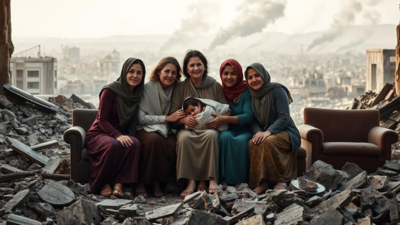Survivors fight to heal from rampant sexual violence in war-torn Sudan

Representative Image (AI-generated)
When a fighter from Sudan's paramilitary Rapid Support Forces (RSF) stormed into Aisha's family home in Khartoum and gave her a grim ultimatum -- marry him or watch her father die -- she didn't think twice.She signed away her freedom, "terrified for my father's life," she told AFP.For a year, the 22-year-old was trapped alone in a house just streets away from her family where she was raped, regularly beaten and eventually suffered a miscarriage."I was completely broken," the former IT student recalled, her voice barely audible.Aisha, using a pseudonym for her safety, is one of estimated thousands of Sudanese women who have been subjected to sexual violence since the war between the army and the RSF erupted in April 2023.A government unit tasked with combating sexual violence against women has documented 1,138 cases since the war began.But the head of the unit, Sulaima Ishaq al-Khalifa, says that number is "only 10 per cent" of the real figure.International watchdogs have accused the RSF of using systematic sexual violence, including rape, sexual slavery and forced marriages, as a weapon of war.But on Sudan's eastern Red Sea coast, a modest compound is offering survivors some refuge.
Behind a discreet gate in a quiet Port Sudan neighbourhood lies the Aman Centre, Arabic for "safety".Founded in August 2024, the centre has supported more than 1,600 women and girls fleeing sexual violence.Here, survivors receive trauma counselling, medical aid, legal advice and even vocational training in baking, crochet and embroidery.At the centre, Aisha said she began to regain her footing, learning to make pastries and thinking about a future again.In a sunlit room inside Aman, psychologist Lobna Ali flips through a thick stack of intake forms. Women arrive at the facility devastated, said Ali, who founded the centre."We mostly see girls raped by groups of men," she continued. "One survivor was raped by 10 RSF fighters."More than a third of the victims are girls under 18, she said, adding that many arrive pregnant.The women are offered legal guidance, including when they decide to give up children conceived by rape for adoption."The first thing we say is that their health -- mental and physical -- is all we care about," Ali said.The conflict in Sudan, now in its third year, has killed tens of thousands, displaced 13 million and created what the United Nations describes as the world's worst humanitarian crisis.
Salma, 23, arrived at Aman after fleeing Hasaheisa, a town in the central state of Al-Jazira, south of Khartoum, where she was sexually harassed by RSF fighters."There were eight of them" who attacked a house where she was hiding with other young women, she recalled. "They assaulted the girls. Some were raped. Others were beaten with weapons," said Salma, also using a pseudonym for her safety."I went into shock," she told AFP, her hands trembling.Hundreds of thousands fled Al-Jazira in December 2023, when the paramilitary swept through, looting and laying siege to entire villages.This year, the army pushed the RSF out of Al-Jazira, but Salma, now residing in Port Sudan, says she still "can't move on"."I want to finish my education and think about my future, but sometimes I find myself reliving what happened," she added.At the centre, she often sees Amna, a 23-year-old psychologist, who herself was once a captive too.Abducted in Khartoum because of her brother's government ties, she was held for 11 days with dozens of other women and girls by RSF fighters.Some were married off. Others were used as bargaining chips, for blackmail or ransom, and "the treatment was beyond cruel", she said.Now, Amna helps others survive -- even as she continues her own healing.In neighbouring Egypt, where 1.5 million Sudanese have fled, psychologist Sara Montasser meets an average of five new Sudanese rape survivors per day in a Cairo community centre."They need to understand that this trauma is why they're not sleeping well, overwhelmed with anxiety and sometimes taking it out on their children," said Montasser.But the symptoms ease as the survivors regain control of their lives, she added."Survivors have to feel actively involved in their own healing."













